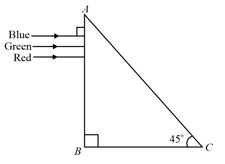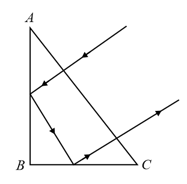Umakant Kondapure, Collin Fernandes, Nipun Bhatia, Vikram Bathula and, Ketki Deshpande Solutions for Chapter: Refraction of Light, Exercise 3: Competitive Thinking
Umakant Kondapure Physics Solutions for Exercise - Umakant Kondapure, Collin Fernandes, Nipun Bhatia, Vikram Bathula and, Ketki Deshpande Solutions for Chapter: Refraction of Light, Exercise 3: Competitive Thinking
Attempt the practice questions on Chapter 5: Refraction of Light, Exercise 3: Competitive Thinking with hints and solutions to strengthen your understanding. MHT-CET TRIUMPH Physics Multiple Choice Questions Part - 1 Based on Std. XI & XII Syllabus of MHT-CET solutions are prepared by Experienced Embibe Experts.
Questions from Umakant Kondapure, Collin Fernandes, Nipun Bhatia, Vikram Bathula and, Ketki Deshpande Solutions for Chapter: Refraction of Light, Exercise 3: Competitive Thinking with Hints & Solutions
How much water should be filled in a container in height, so that it appears half filled when viewed from the top of the container?
[given that, ]
The angle of a prism is . One of its refracting surfaces is silvered. Light rays falling at an angle of incidence on the first surface returns through the same path after suffering reflection at the silvered surface. The refractive index , of the prism is
The refractive index of the material of a prism is and the angle of the prism is . One of the two refracting surfaces of the prism is made a mirror inwards, by a silver coating. A beam of monochromatic light entering the prism from the other face will retrace its path (after reflection from the silvered surface) if its angle of incidence on the prism is:
When a glass prism of refracting angle is immersed in a liquid, its angle of minimum deviation is . The critical angle of glass prism with respect to the liquid medium is
A beam of light consisting of red, green and blue colours is incident on a right-angled prism. The refractive indices of the material of the prism for the above red, green and blue wavelengths are and , respectively.

A ray falls on a prism and travels as shown in the figure. The minimum refractive index of the material of the prism should be

Assertion: By roughening the surface of a glass sheet its transparency can be reduced.
Reason: Glass sheet with rough surface absorbs more light.
A point source is placed at co-ordinates in plane. A ray of light from the source is reflected on a plane along the X-axis and perpendicular to the plane. The reflected ray passes through the point . What is the path length of the ray from to
